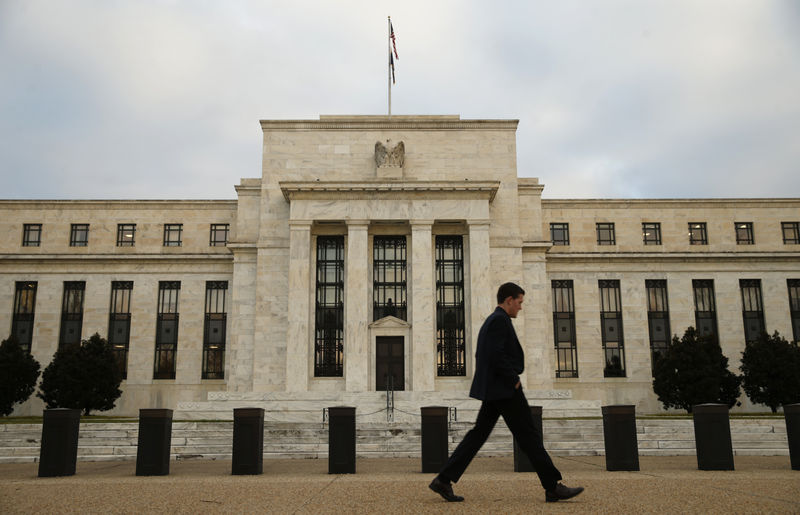Trump to impose 100% tariff on China starting November 1
(Bloomberg) --
It already seems clear that Friday’s rally was not the turning point that some emerging-market investors hoped for. Nor will the U.S. Federal Reserve’s emergency rate cut on Sunday night be enough to reverse what’s the fastest collapse in risk assets in more than a generation.
While governments increase efforts to slow the spread of the coronavirus, stimulus measures could be too late to prevent a global recession, with businesses suffering from both supply and demand shocks. The MSCI Emerging Markets Index of equities fell 4.6% on Monday, while a measure of currencies lost 0.5%, even after the Fed cut its key interest rate almost to zero and promised to boost its bond holdings by at least $700 billion. Along with the central banks of Japan, the Eurozone, the U.K., Switzerland and Canada, it also said it use swap lines to ensure the international supply of dollars.
South Korea and Sri Lanka each cut interest rates in emergency moves on Monday, while China pumped liquidity into its financial system.
“Global markets are facing their gravest challenge since the Great Recession,” Andrew Sheets, Morgan Stanley’s London-based chief cross-asset strategist, said in a note on Sunday. “Low rates don’t solve a shortage of semiconductors if a factory needs to shut down. A tax cut won’t show up as spending if consumers don’t have confidence in the broader public health response.”
Read: Central Banks Coordinate to Boost Global Dollar Liquidity
Emerging markets ended last week on a positive note, but it was small consolation. In the five days through Friday, MSCI Inc.’s index of developing-nation stocks crashed 12%, the most since the 2008 global financial crisis. The Mexican and Colombian pesos each depreciated more than 8% against the dollar to record lows, battered by Brent oil’s slide below $35 a barrel. Average sovereign dollar-bond spreads blew out by 122 basis points to levels not reached in more than a decade.
Listen: EM Weekly Podcast: All About the Virus and Monetary Responses
Asia Rates Bonanza
- Indonesia, the Philippines and Taiwan are set to decide on interest rates this week
- Bangko Sentral ng Pilipinas and Bank Indonesia are expected to add to the global wave of easing, with Bloomberg Economics forecasting they will each deliver a 25 basis-point rate reduction
- The collapse in oil prices will ease pressure on Indonesia’s current-account deficit and Philippine inflation, giving authorities room to lower rates
- Sri Lanka cut its standing lending facility rate by 25 basis points to 7.25% in an unscheduled decision on Monday. It said there was an urgent need to support the economy
- South Korea cut its key interest rate by 50 basis points, to 0.75%. The central bank is slated to convene April 9 for a regular meeting. Some economists see that as another occasion for a rate cut
- Trade data are due from Taiwan on Friday
- China’s industrial output declined 13.5% in January and February from a year ago, while retail sales fell 20.5%, the country reported on Monday. The data was worse than economists had expected; the consensus in a Bloomberg survey was for industrial production to fall 3%
- The People’s Bank of China added 100 billion yuan ($14 billion) into the banking system via its one-year medium-term lending facility, keeping the rate unchanged at 3.15%
- The move follows the PBOC’s widely-expected announcement late Friday that it will trim the amount of cash some lenders must hold in reserve
- The cut, which was also effective from Monday, will free up about 550 billion yuan of liquidity in the financial system
- The Philippines reported better-than-expected remittances data on Monday. The funds are a key support for the currency, which is starting to lose its resilience to the global sell-offs, as stocks sink into bear-market territory
- South Korea is due to release producer-price inflation data on Friday
- Turkey and South Africa will make interest-rate decisions on Thursday. Turkey’s central bank is expected to cut by 50 basis points to 10.25%, which would extend its easing since July to almost 1,400 basis points, according to a Bloomberg survey
- The South African Reserve Bank is expected to reduce its key rate to 6% from 6.25%, though Goldman Sachs Group Inc (NYSE:GS). says a cut of 50 basis points is possible
- The country releases its inflation numbers for February on Wednesday
- Russia’s monetary authorities decide on interest rates on Friday, with almost all analysts surveyed by Bloomberg forecasting that they will hold at 6%
- Nigeria, Africa’s biggest oil producer, publishes February inflation data on Monday, with economists expecting the yearly rate to have climbed to 12.3%, from 12.1% in January
- Brazil’s central bank may cut its key interest rate when it meets on Wednesday, although any additional easing was put into question by the market collapse. Swap rates spiked a day after Congress overturned a presidential veto on a welfare benefit, raising concern about the outlook for Jair Bolsonaro’s reform agenda
- Chile’s fourth-quarter GDP data will probably flag a contraction linked to protests that took place last year, according to Bloomberg Economics
- Colombia will publish economic activity for January on Friday, though a positive reading may do little to ease concern about lower oil prices and record weakness in the peso. The currency is the worst performer in emerging markets this year
- In Argentina, investors will be watching for February budget data as the government continues to work toward the restructuring of about $69 billion of foreign bonds
